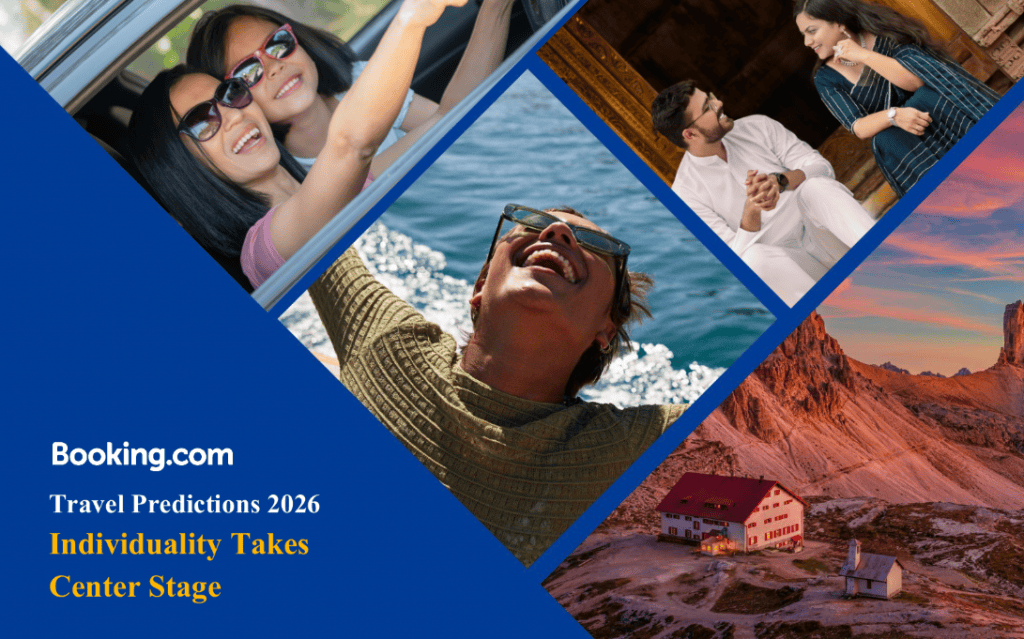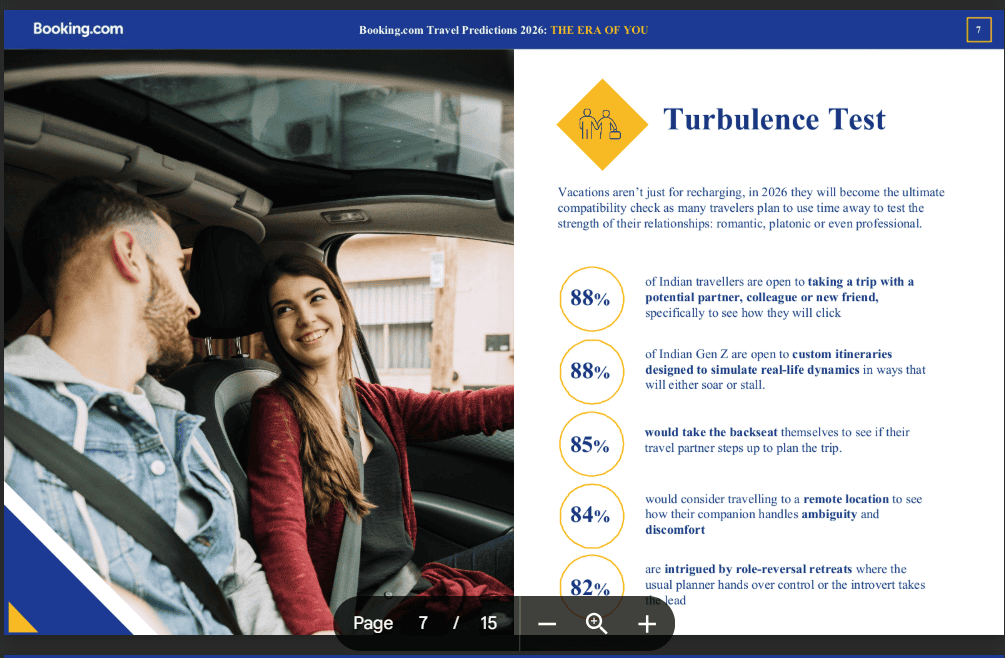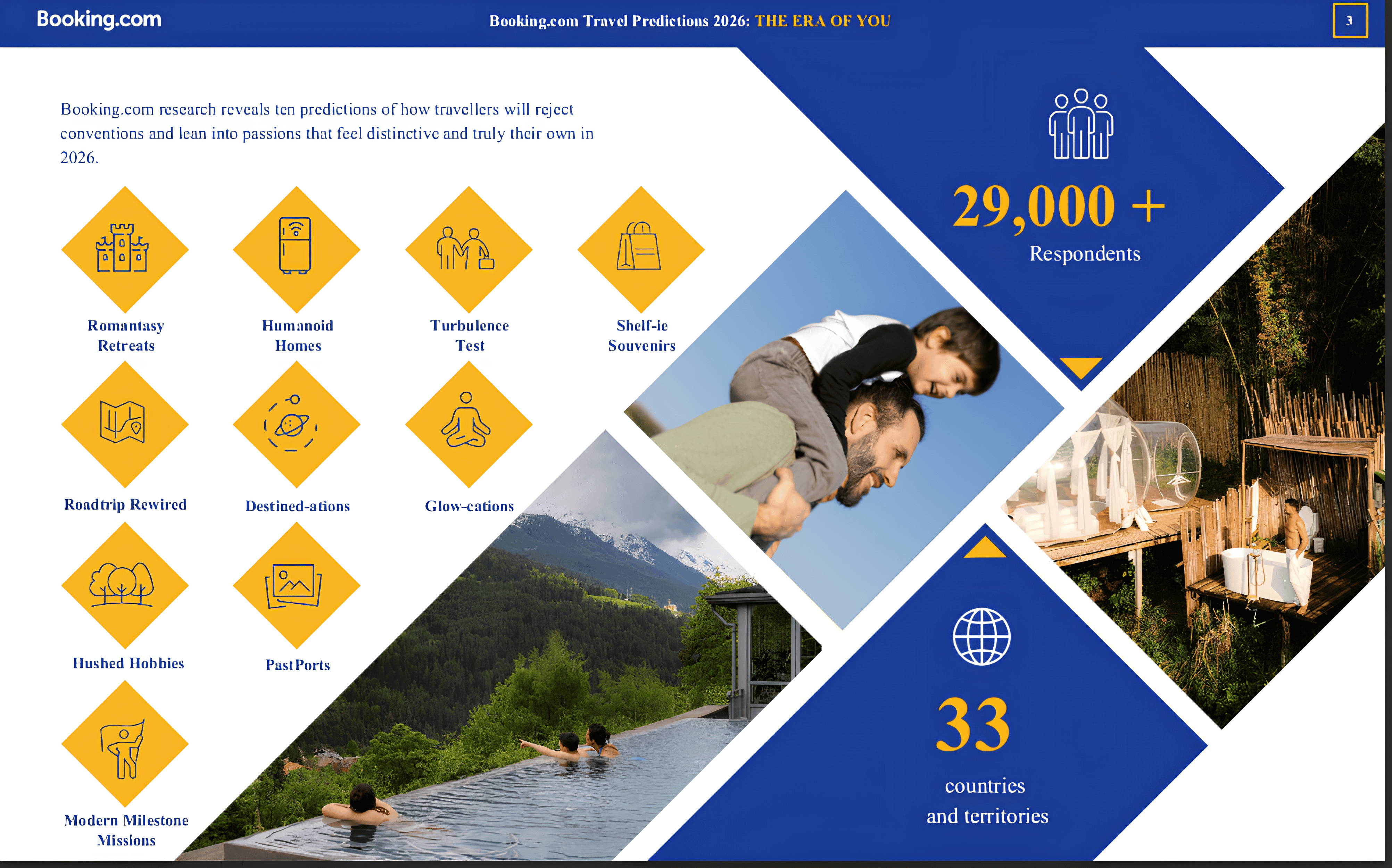Booking.com 2026 edition Travel Predictions, based on an online survey of 29,733 adults across 33 countries and territories (including 1,007 respondents in India) conducted in July–August 2025, indicates that 2026 will be defined by ultra-personalised travel.
Preferences cluster around two clear drivers: technology that enables precision and ease, and personal or interpersonal motives that place identity, relationships and meaning at the centre of every journey.

Travel 2026 : Tech-led travel choices
Indian travellers are comfortable letting advanced tools and smart environments help curate, navigate and optimise their trips. In the realm of fantasy-inspired travel, 90% are open to AI suggestions that match specific aesthetics, identify secluded “storybook” stays, or pinpoint real-world filming locations. Accommodation expectations are evolving as 94% say they would book tech-enhanced homes, with cleaning bots (44%), robotic chefs (37%) and behind-the-scenes sustainability systems (39%) among the key draws; novelty (32%) and brag value (33%) also contribute to intent.
On the road, technology smooths logistics and discovery: 85% would use an app to find travellers on a similar route, 86% would rely on AI to map scenic, tailored drives, and 87% of Gen Z are open to self-drive or AI-guided routing.
Wellness, too, is becoming data-led according to Booking.com 86% would use AI to match destinations to personal skin needs, the same share are open to personalised hydration stations that adapt to climate and activity, 80% are intrigued by smart mirrors that offer real-time analysis, and 86% would try sleep-optimising suites, with approaches ranging from thermal traditions to DNA and microbiome testing.
Even quieter nature pursuits now benefit from digital helpers, as travellers use species-identification apps and AI-guided trail suggestions to deepen engagement with local habitats. Memory-led travel is similarly enabled by technology: 89% would use AI photo-mapping or heritage-tracing tools to locate and revisit the exact places captured in old photographs.
Travel 2026 : Human drivers of choice
A second set of choices is driven by identity, relationships and meaning. Fiction is moving off the page and into itineraries, with 91% of the participants interested in romance-inspired destinations, 79% open to role-play retreats, and 40% definitely planning immersive, story-driven escapes.
Many see travel as a proving ground for connection: 88% would travel with a potential partner, colleague or new friend specifically to assess fit; 84% would choose remote locations to test resilience; 82% would attempt role-reversal planning; 80% would accept strict constraints such as budget, language or limited connectivity; and 85% would hand over the itinerary to a companion. Gen Z are the most experimental, with 88% open to custom “relationship simulation” plans.
Everyday spaces at home are becoming expressions of place and memory as 84% would buy design-led kitchenware or pantry items while travelling and 79% would choose destinations known for them, motivated by reliving places while cooking (33%) and showcasing craft and sustainability (37%).

The classic road trip is being reimagined around human connection, with 97% open to carpooling for spontaneity (93%), the chance to meet new people (92%) and to share driving responsibilities (88%), expanding access for non-drivers in particular.
Timing and destination choices are also shaped by belief systems: 74% would change or cancel trips on a spiritual advisor’s guidance, 70% would reconsider plans based on horoscopes and 66% would adjust if Mercury is in retrograde; 64% already consider moon phases, solstices or energy sites, led by Gen Z (73%) and many millennials (63%).
Quiet nature pursuits are rising as 56% say they would travel to feel closer to nature (including 50% of Gen Z) and 23% turn to reflective activities; interest spans hotel-hosted foraging (91%), fishing or birdwatching (90%), and moth, butterfly or insect spotting (83%). Memory-first “PastPorts” trips are anchored in emotion as travellers return to precise scenes to share moments with loved ones (56%), recapture youthful connection (49%) or mark growth and closure (44%).

Finally, milestones are being redefined: 71% say they don’t need traditional reasons to book a trip and 31% would visit a dream destination without waiting, citing rewards for hard work (81%), new jobs or promotions (34%), post-breakup resets (15%), small windfalls such as tax refunds (13%) and health milestones including sobriety or fitness (32%).
In essence, the 2026 travel landscape is being shaped by two powerful currents moving in tandem.
On one side, technology is becoming an unobtrusive co-pilot—animating fantasy-led itineraries, powering robotic and data-smart stays, fine-tuning wellness, and opening roads and trails with AI guidance and real-time discovery.
On the other, personal and interpersonal motives are redefining why, when, and with whom people travel, from compatibility trips and spiritually timed journeys to quieter nature pursuits, memory-led returns, and self-defined milestones.
Together, these forces signal a shift away from uniform experiences towards journeys that are more pwersonalised.
Read More: News




1 Comment